First, a disclaimer, apology, and homage, all rolled up into one. This is a post about Death and Birds. But I’m an imposter in this area. If you want to read THE expert, at least when it comes to some of the most beautiful writing in this area (and on Substack!), you MUST read ’s Substack. And I’m serious. I don’t intend for my writing to be beautiful—that’s not my aim. Rarely has anything I’ve written been said to be beautiful. But Chloe can’t write anything that’s not beautiful. Her Substack itself is called “Death & Birds.” You need to trust me on this—if you haven’t come across Chloe’s page, you “should” read something of hers. (And I don’t “should” on people lightly!). Here, I’ll make it easy for you—her latest:
Even easier, here’s an example of her writing—the first paragraph from the post linked above:
“Like light, dying exists on a spectrum. As comforting and convenient as binaries and hard edges can be, very few exist in nature. It is a most subtle and sacred moment in time when a being’s trajectory falls out of line and curves towards the orbit of their worldly departure. A slow, silent circling, at first, like that of the Red Kites who wheel the sky in unflinching observation. Metaphor permits us a few inches closer to that which language falls short of, and the dying will often speak of journeys, of trips on the horizon for which they must prepare. Beneath confusion and altered states lies a knowing, an awareness that a process has begun, and as the river’s current strengthens a choice must be made: to battle, negotiate, or surrender. Typically, we defer to whichever muscle we’ve most strengthened in life.”
Beautiful, the language, right? Look not for competition here, or even comparisons; only admiration (of the “imitation is the sincerest form of flattery” kind). So what follows is not meant to be even a close approximation of what Chloe writes. I’m nowhere near that level of skill as a writer. What follows is only about my own Alchemy and what I’m currently experiencing here on the land I steward, in the middle of spring, the “rebirthing season,” (ironic as you’ll see), and amidst the life with which I share this land. Oh, and there’s another little and subtle homage to Chloe’s writing, here, that maybe only she will perceive—cuz I’ve perceived it in hers.
This is a Post about Death & Birds (sorry Chloe, but thanks! 🙏🏼). But Kert’s version.
A little ditty if you will.
We named them Jack and Diane. (If you didn’t grow up in the 80’s, I’m truly sorry for you.)
I think it was close to, if not even the very first spring itself living in our new home, when we found out we shared our land with a breeding pair of ducks. We are fortunate to have two small ponds on our land—perfect territory for “two American ducks just doing the best they can” to find safe places to rear their kids. We love that we share our space with them, we love that we share our space with a lot of other Beings who, themselves, are just doing the best then can in a place where humans are creeping and encroaching more and more, everyday, upon the land they’ve inhabited for multiple millennia—an encroachnent that literally eats up their habitats, nesting areas, shelter, and sources of water. We’ve been visited by, or are spacemates to, deer, snakes, squirrels, frogs, bats, salamanders, opossum, moles, rodents, multiple species of birds (owls, ravens, eagles, seagulls, hummingbirds, woodpeckers, herons, and hawks to name a few), coyote, and others (more on “the others” in a sec).
But this is a little ditty about Jack and Diane.
We’ve seen Diane nest and raise a clutch of hatchlings over the course of multiple springs. With delight, we’d see, all of a sudden, Diane and her brood swimming in the pond or walking around the land. At first, she used the same nesting space—a protected area she discovered under a shrub adjacent to the pond. When I needed to work in that area of the yard, weeding, planting, mowing, etc., I’d always check to see if Diane was on her nest and if so, I would greet her by name and wish her well saying “Mama, may you be happy and safe, may you be healthy and strong, and so too may your babies.” Over time, I like to feel she’s grown accustomed to our presence. Jack, btw, is a little more boorish and aloof—once Diane is on her nest, Jack comes and goes at his pleasure it seems. Typical male (though to his credit, there ain’t a whole lot for him to be doing when Mama’s on her nest; but I digress).
Their visits have become predictable; near the start of every spring now, we ask ourselves when we might have the first sighting of the pair. And every spring so far, they’ve come. It never ceases to delight. Personally, I feel both honored of the trust they’ve given us to provide and allow them this space in cohabitation, and secure in the knowledge they’ve accepted us, perhaps begrudgingly, as a part of their natural world now too. They’ve adopted us as their kin; we’ve adopted them as our, and their brood as our nieces and nephews. Bonds have formed. And I’m not embarrassed or bashful to say that.
Side note: you might remember that we’ve had our land certified as a natural wildlife habitat. This means we intentionally steward the land such that wildlife have the potential to find food, shelter, water, and nesting sites.
Now, a question for you. Do you believe ducks grieve?
I don’t think that’s a small or irrelevant question even given the drama of the rest of the world right now—with the concerns we puny humans create for ourselves and for other humans and other species. In fact, I think one’s belief about this one simple question, even if we extended it to all animals—do you believe animals in general grieve?—says a lot about us, how we’ve gotten to be who we are as a quasi-heartless species who pauses not a skosh when it comes to inflicting HUGE and indiscriminate damage to the land, to animals, and especially to members of its own species.
Do you believe ducks grieve?
It’s an essential question.
You see, my wife and I share our home with all those other animals I listed above (we never use the poisons of pesticides or herbicides or traps). We proudly share our space with Jack and Diane. And…
… we share our home with raccoons, too.
Diane, two weeks ago, “lost” her second clutch of almost-hatchlings because we share our land, Diane and us, with raccoons. Our raccoons are more reclusive and shy—we don’t typically see them, nocturnal as they are by nature; we usually know of them only by the evidence of their presence. Like paw prints. And broken egg shells. A few years ago, we did spot the occasional raccoon—either roaming along the edges of our acre of land, down in a gulley of a greenbelt adjacent to our home, or in a tree. We’d seen them likely pre-dawn or just after dusk. This was also when we discovered for the first time evidence of Diane’s loss and the first time I wondered if ducks grieve. Putting two and two together, it wasn’t hard to discover we were even THAT part of nature here too. The part where Death feeds life. And must.
Just prior to nesting season earlier this spring, before sunrise one morning, under the lights dangling from a trellis, I spotted two raccoons ambling around on our grounds. I was fascinated and felt a sense of dread—because Jack and Diane had just started to visit.
“Life doesn’t feed on life. Life doesn’t nourish life. Death feeds life….Our deaths can, in every sense of the word, be meant to feed life – unless we refuse to die, or fight dying, or curse dying, or spend all our dying time not dying.”
~ Stephen Jenkinson
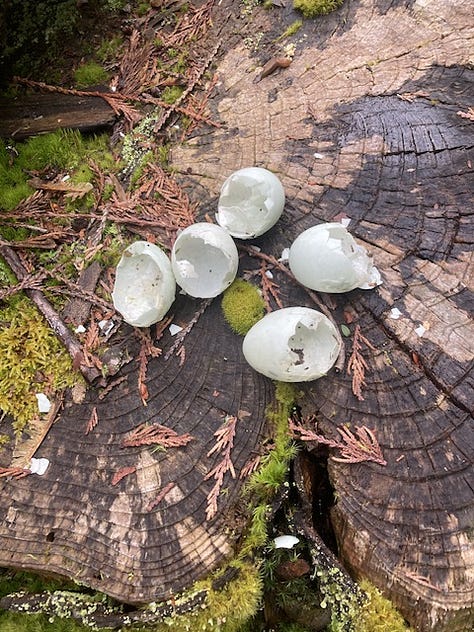

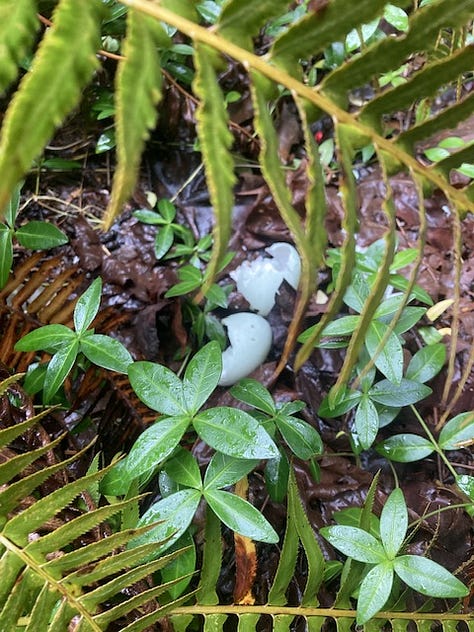
Death, any Death, no matter the species, if we are to bring to it a sense of the sacred, a sense of reverence, a sense of grief when we bear witness to its presence, ideally prompts us to try to understand how it is meant to feed life. This is one of the ways Jenkinson says Death can be of benefit to us.
Anything less means we’re realizing the “unless” part or Jenkinson’s quote above; which would just be another way of saying Death is meaningless. Were that to be so, life itself could then be said to be meaningless—in that regard, the two, Life and Death, are not different.
But life is a miracle. And so, by my definition at least, we forget “all life has meaning” to our great peril.
Doubt me? Remind yourself then of what is happening in Ukraine. In Gaza. Remind yourself of the mega billions of dollars men vie for in the development and creation of weapons of mass destruction, of any destruction. Remind yourself of the pain humans cause in this regard by showing, through their actions, that some lives are meaningless, so their Deaths, caused by human hands, are therefore meaningless as well. With that “men”tality, it becomes all too easy to take life.
We don’t realize the peril under which we’re living.
The question I posed for you above, if you believed ducks grieve, was not a rhetorical question, but I meant it only for you. Because I have my answer. I know the answer.
In a way, Death is a miracle too.
I grieve for Diane. I grieve for animals who’ve experienced a close Death. And, because I choose to believe, I believe I grieve with them. I believe animals do grieve, by instinct; that humans are not the only species that feel a deep sadness and emptiness upon the death of kin. Well, some humans anyway. Now, of course biologists have proven animals like elephants, orcas, chimpanzees, and the like exhibit even ritualistic grief behavior upon the Death of a member of their clan. But I believe all animals undergo some form of an instinctual feeling of emptiness, hollowness, and grief, especially when their offspring have died.
I also believe raccoons grieve; and I know they know the feeling of hunger. So I don’t lament the presence of raccoons on our property. They live here too. We live among them. They were simply fulfilling the fullness of natural law—that Death, even the Death of soon-to-be hatchlings, feeds life. They were simply being raccoons. We are a part of THAT nature too, despite my sadness for the 16 eggs in total, over two clutches, that Diane lost. Diane did the absolute best she could. Even the raccoons are doing the best they can. (The jury is still out on Jack.)
Grief runs in all directions. Death feeds all life. It must.
I wonder sometimes how this would change us. If we all understood that all animals grieve, I wonder if that would cause us to behave differently upon this fragile planet. I wonder if we’d change our diet (I have, going on a Vegan lifestyle for over a decade now!); if we’d change how we develop land; if we carved out more natural areas that are to be left in their natural states; if we hunted less, or at least approached “the hunt,” as our Indigenous ancestors did, and some tribes still do, with a more profound sense of respect, reverence, and reciprocity for the life we were about to take; if we changed how we entertain ourselves (actually, we have changed some in this regard as evidenced by the abolishments of circuses and theme parks like SeaWorld, and how zoos and aquariums have changed some of their practices and policies); if we thought less of killing and more of capturing and releasing elsewhere; and if we, ourselves, would extend compassion when we bear witness to animal loss…
I wonder if this would change us.
“The meaning of life is that it ends.”
~ Franz Kafka
Alchemy
I want to believe these things because I don’t want to lose my humanity. I want to become more human, which, for me, means I have to place my heart into the vulnerable spaces, places, and times where it might, no, where it will become broken. I choose this. And yes, with that choice comes pain. The moment I choose to feel less, should be the moment just after I die. Were I to be wise, that is. This is how I’m allowing Death of all kinds to feed me. Things aren’t supposed to always feel good.
After the loss of her first clutch, Jack and Diane left for a couple weeks. Then, they returned (and yes, I’m assuming this is the same pair, that this is our Diane and Jack). We noticed Diane walking around our property one day, in areas she typically doesn’t walk, looking at different places. She remembered. She remembered the inevitable carnage she likely observed and likely tried to prevent from a pair of masked mammals with black-ringed tails at her other nesting site. So she attempted to find a more secure nesting ground. She thought she might have. Turns out, she didn’t. More opportunities to grieve. They never end. Provided our hearts resist becoming calloused; provided we keep them fragile, vulnerable, and tender (and I pray this to be true for us all), we just might come to a different place of wisdom alongside those who take life and Death as a matter of instinctual and natural fact.
It might not be long before Diane “understands” our land is no longer a viable nesting ground for her. We would be sad by that, come as we have to look forward to their presence. Maybe another nesting pair would try—until they, too, learned in the harshest of ways. Maybe the raccoons themselves will move on to new or different territories of feeding, safety, and birthing. Maybe they too might feed other life. But if I am true to the understanding that Death feeds life, I need to feel a sense of empathy for the raccoons too; they simply carry on in their own never-ending search for food, for cover, for water, and for a place to raise their own young—that’s what raccoons do, they raccoon.
Yes, them too.
Yes, we too.
Which species do you think needs to learn these lessons the most?
(Nevermind. That IS a rhetorical question.)
I want to end as I began, with something of Chloe Hope’s; to close the circle of appreciation and gratitude. And to make sure we all end on a more beautiful note:
“I have heard it said that to understand is to forgive, and so in selfish effort to lighten my heart (lest its weight one day tilt the scales of Ma’at against me) I endeavour to recognise something of myself in everyone, especially so in those whom I least wish to be mirrored by. This practice (sometimes) allows me to see others and myself for the nuanced and perfectly flawed beings that we are, rather than as inherently “good” or “bad”. I am inclined to believe that Death is too layered a thing to be understood, but in my micro (and macro) dosing Death I have come to forgive it. And, in the forgiving, seen that what I once saw as its cruelty, was its love all along.”
Death feeding life, indeed!
(Btw, I’m considering naming the raccoons Bonnie and Clyde. Seems fitting.)
Always and Ubuntu,
~ k
🙏🏼 💙
Postscript: for the record, I buried the eggshell remnants as a part of the sacred ritual of the circle of life. I try to do this with any Death I happen across on our land, or that I, myself, inevitably cause.
“May other Beings benefit from the sacrifice of your body. I am sorry. And thank you.”
An Ancestral Hawaiian chant known as the Ho’ oponopono — with which I usually start each day:
“If today I cause any harm, I am sorry. Please forgive me. Thank you. I love you.”
Okay, I had to. Just because, you know, The 80’s. My era. And my teenage anthem.
“Oh yeah, we’re sayin’ life goes on, long after the thrill of livin’ is gone.”








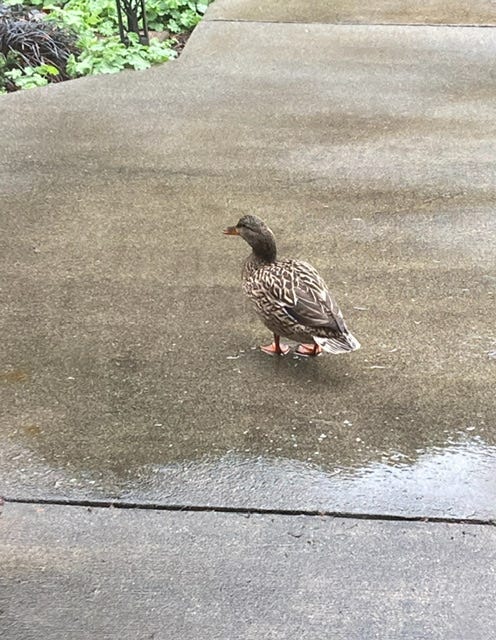
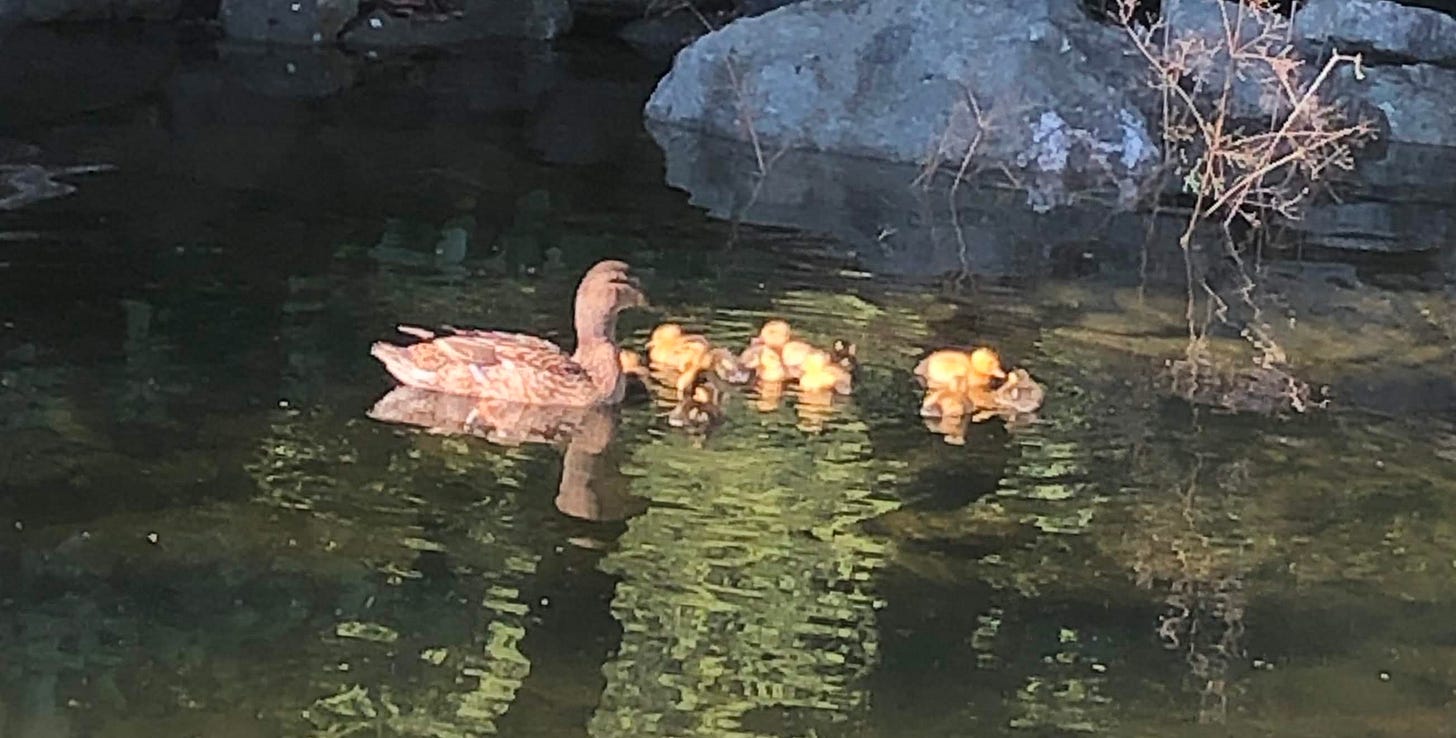

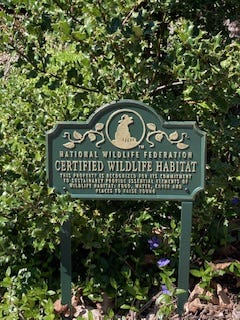




Kert, oh my goodness..! I am truly honoured that you’d even consider an homage to Death & Birds, but the way in which you’ve offered this story of Diane, of Jack, their babies, the racoons, their grief, and the divine right of all of those things to exist together—it’s profoundly moving, and profoundly wise. How beautiful that you’ve had your land certified as a natural wildlife habitat, how beautiful that you’re living so mindfully of your wild kin. I am greatly relieved to know that you’re in the world. I'm humbled by your words about mine, and I offer you the deepest of bows for the ways in which you are witnessing this extraordinary world of ours. Thank you, so much, Kert.
This line stayed with me: “Grief runs in all directions. Death feeds all life. It must.” There’s a quiet truth here that I don’t think we talk about enough.
Your writing helped me see that grief isn’t just ours to carry but part of the larger web. The way you witnessed Diane’s loss and honored it with presence and care, a kind of reverence we need more of. Thank you for helping me feel it. Lastly, you help us see how our beliefs shape our behavior, and how choosing to stay emotionally open, even to pain, is a path to becoming more human.